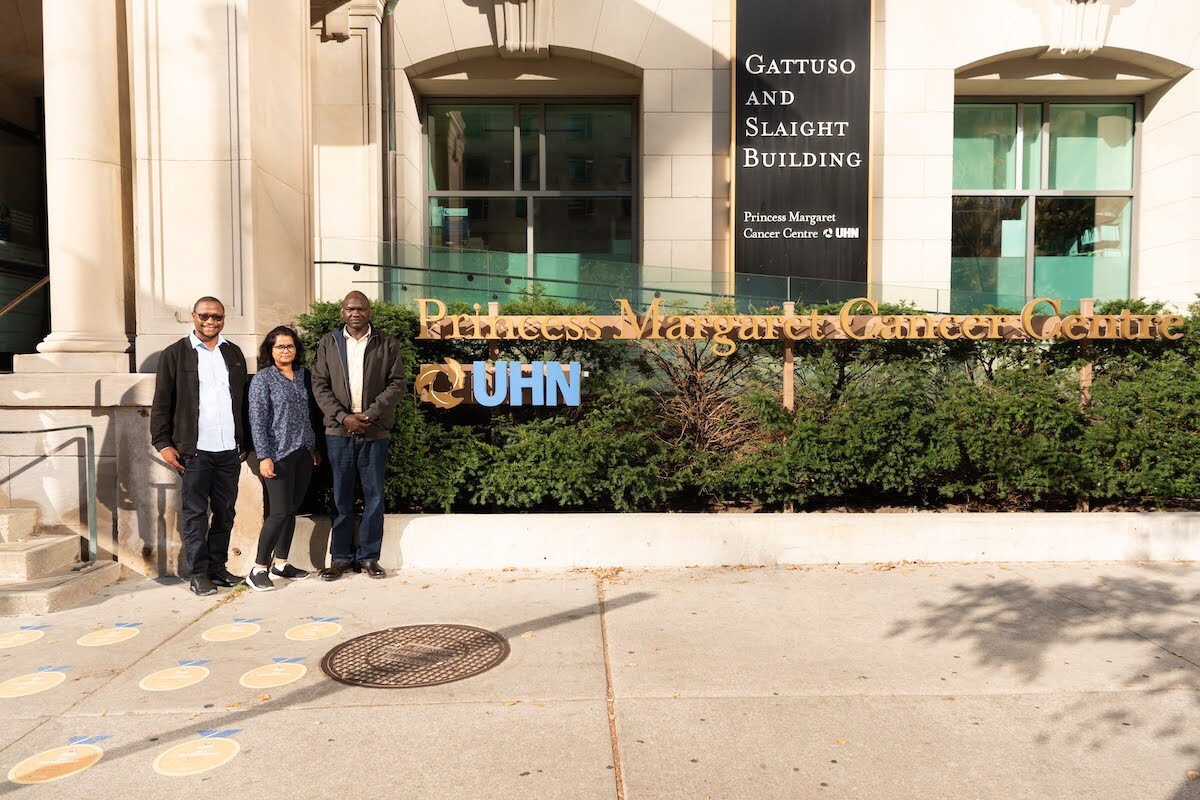Mobile Menu
- Education
- Faculty
- Research
- News & Events
- Divisions
- Equity, Diversity & Inclusion
- About Us

This fall, our Department hosted three gynaecologic oncology fellows from Moi University School of Medicine in Eldoret, Kenya as they conducted a six-week observership at several different Toronto hospital sites, a component of the Department’s 15-year partnership with Moi through the AMPATH Consortium.
Dr. Afrin Fatima, Dr. Anthony Gitari, and Dr. Wilfred Inzama travelled to Toronto primarily to train in radiation oncology and palliative care — two areas of care that Kenyan trainees are usually unable to get exposure to locally.
“This has been a life-changing learning experience because I’ve gotten to see so much that I wouldn’t get to see in my country,” Gitari said. “We didn’t have a palliative care unit at home, so getting to join the team at the Princess Margaret Cancer Centre and see how the department is organized and dedicated to offering palliative care to its patients was exciting. Radiation oncology is another field we really don’t get much exposure to back home, but here we got lots of exposure in clinics and the OR with an excellent team of radiation oncologists who were ready and willing to answer our questions.
“It has been a great learning experience.”
Since 2007, the Department of Obstetrics and Gynaecology (along with our institutional partner, Indiana University) has been the lead North American member of the reproductive health component of AMPATH (Academic Model Providing Access to Healthcare), a multi-institutional academic collaboration that supports a bi-lateral exchange of faculty, residents, fellows, and medical students between Toronto and Eldoret.
Our Department has also fostered the successful development of fellowships at Moi University in gynaecologic oncology and maternal-fetal medicine. The gynaecologic oncology fellowship that Drs. Fatima, Gitari, and Inzama are now pursuing was the first such training program in East Africa, the first gynaecologic oncology fellowship in sub-Saharan Africa outside of South Africa, and the first clinical fellowship of any kind at Moi University.
“When we started, there were no gynaecologic oncologists in Kenya — our program has now, as of the end of 2023, trained 13,” said Dr. Barry Rosen, a past professor with our Department who served as the first director of the program and remains an international mentor for the program in Kenya. “What has really made this possible is the quality of the fellows. The fellows entering this program have been so incredibly bright and so incredibly committed to what they’re doing.
“It’s that commitment of both the Kenyan faculty and the students that have really made this work so well.”
From the beginning, the gyn onc program at Moi was launched with long-term success as a goal.
“One of the things we did not want to do was take in a big team, do a lot of surgeries and clinics, and then leave,” recalled Dr. Allan Covens, a professor in our Department who served as the fellowship director and more recently head of our gynaecologic oncology division and who played a key role alongside Dr. Rosen in establishing the gyn onc program in Kenya.
“The program was designed to first train Kenyan surgeons who would then go on to become the teachers. Our goal was creating sustainability, and I think we’ve done a good job of that.”
During their recent observership, the visiting fellows said that a highlight was witnessing first-hand several procedures they had little prior experience with, including interstitial brachytherapy and robotic surgery. They were also inspired by some of the physician-patient communication they observed.
“One thing we have seen that we can take home is that interactions with the client are looked at differently. Here, you interact with the client, come up with a plan, share it, and they have the autonomy to decide what should be done,” Inzama observed.
“It was good to see how the communication between radiation oncologists and gyn oncologists is done and how they collectively manage these patients, particularly when administering radiation therapy,” Fatima said. “I think we need to establish the kind of communication we saw here in Kenya.”
This exchange is made possible by generous philanthropic support, primarily via the Purpleville Foundation and the Dr. Alan Bocking Travel Fund.
Ultimately, the fellows felt they were returned home with actionable ideas for improving patient care.
“This allows us to be leaders in our field because we can see where we are and where we would like to be,” Gitari said. “We would like to be at the same level that we have seen here. With what we have learned, we can go back home and advocate with our governments and our local hospital management teams to help us improve care for patients based on the care we’ve observed here.”
